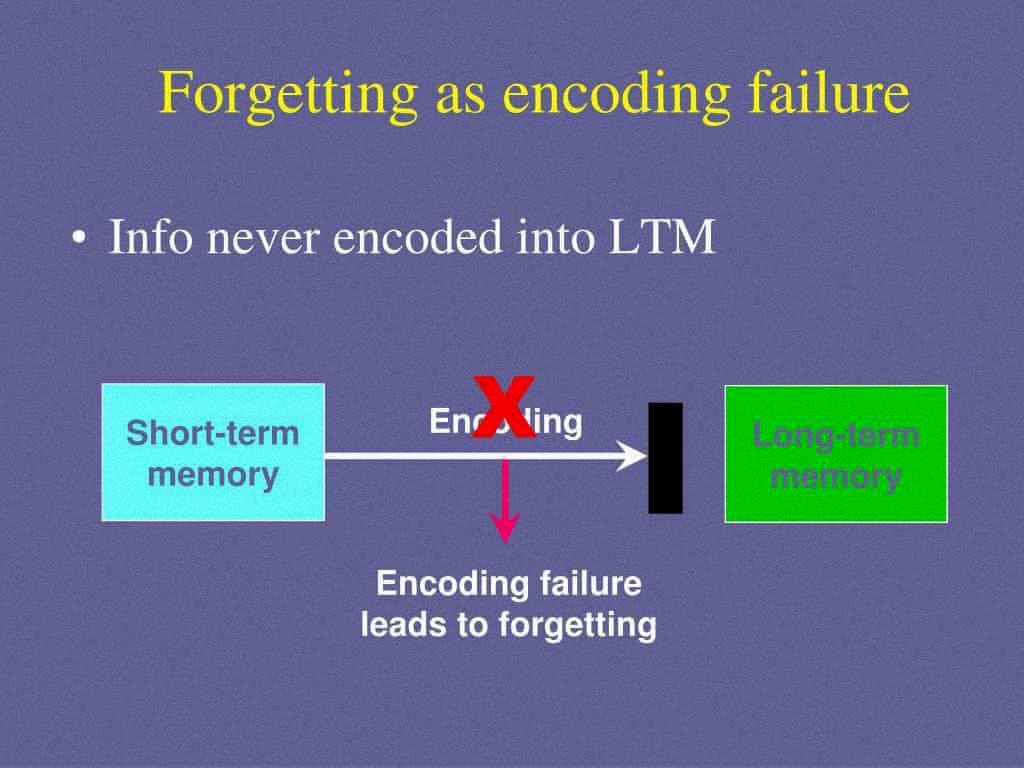Hello and welcome to this blog post about encoding failure, a common reason for forgetting information. Encoding failure occurs when information is not successfully entered into our memory system, meaning it was not properly stored for later recall. In this post, we will discuss what encoding failure is, why it happens, and how we can prevent it.
So, what exactly is encoding failure? To put it simply, encoding failure happens when we fail to pay attention to the details of a particular piece of information. This can be due to various reasons such as being distracted or not being interested in the information at hand. Essentially, if we don’t make a conscious effort to encode the information, it will not be stored in our memory.
One classic example of encoding failure is the inability to remember the details of a coin. Despite seeing coins on a daily basis, many people cannot distinguish the correct version of a coin from the incorrect ones when presented with several possible images. This is because they did not encode the details of the coin into their memory in the first place.
Now, you might be wondering why encoding failure happens. There are many reasons why we may fail to encode information. Sometimes, we are simply not paying attention to the details, and our brain does not process the information well enough to store it for later recall. Other times, we may be distracted by something else, or we may not be interested in the information, making it less likely to be encoded. Our mood can also affect our ability to encode information, with negative moods often leading to decreased attention and encoding ability.
So, how can we prevent encoding failure? The best way to prevent encoding failure is to pay attention to the information we want to remember. This means being present in the moment and actively engaging with the material. We can also use memory strategies such as repetition, association, and visualization to help us encode information more effectively. Additionally, setting aside distractions and creating a positive learning environment can improve encoding ability and prevent memory loss.
Encoding failure is a common reason for forgetting information, and it happens when we fail to properly store information in our memory system. By paying attention to the information, uing memory strategies, and creating a positive learning environment, we can prevent encoding failure and improve our ability to recall information when we need it.
Examples of Encoding Failure
An encoding failure occurs when information is not properly transferred from our short-term memory to our long-term memory. One classic example of an encoding failure is our inability to remember the details of a common object, such as a coin. Despite seeing coins almost every day, many people cannot accurately recall the specific details of a coin, such as its design or denomination, when presented with several possible images. This is because our brains may not prioritize encoding this information as important or relevant, and therefore, it is not stored in our long-term memory.

Source: h-o-m-e.org
Causes of Encoding Failure
Encoding failure refers to the inability to successfully store information into our memory. This can occur due to varous reasons, but one of the most common causes is a lack of attention or distraction. When we are not focused on specific details, our brain fails to create strong neural connections that are required for effective encoding. Furthermore, if the information is not meaningful or relevant to us, it is unlikely to be retained in our memory. Additionally, stress, fatigue, and other cognitive factors can also impact our ability to encode information. encoding failures occur due to a combination of attentional deficits, lack of meaning, and other cognitive factors that hinder the process of memory storage.
The Relationship Between Encoding Failure and Forgetting
Encoding failure can be considered a type of forgetting. Encoding refers to the process of taking in and processing information in a way that can be stored in our memory. If we fail to properly encode information, then it cannot be stored and later retrieved, leading to forgetting. This can happen for a variety of reasons such as being distracted or not paying enough attention to the information in the first place. Therefore, encoding failure can be a primary reason for forgetting something.
Differences Between Encoding Failure and Retrieval Failure
Encoding failure refers to the situation in which information never gets stored in our memory system in the first place. This means that we may fail to remember somethig because we did not pay enough attention to it, or because we were not able to process it deeply enough to create a strong memory. On the other hand, retrieval failure occurs when information has been stored in our memory system, but we are unable to access it accurately at a later time. This can happen due to interference from other memories, or because we are unable to retrieve the information in the same context or state in which it was originally learned. Therefore, the main difference between encoding and retrieval failure is that in the former, the information never made it into our memory system, while in the latter, the information has been stored but we are unable to retrieve it accurately.
Types of Encoding
There are three main types of encoding: visual encoding, acoustic encoding, and semantic encoding. Visual encoding refers to the process of encoding information based on its visual characteristics, such as its shape, color, or size. This type of encoding is commonly used when we remember images, charts, or diagrams.
Acoustic encoding, on the other hand, involves encoding information based on its sound or auditory characteristics. For instance, we may remember a phone number by repeating it in our head, or a song by remembering its melody.
Semantic encoding deals with encoding information based on its meaning or significance. This type of encoding is the most complex and involves the interpretation and understanding of the information. Semantic encoding is used when we remember the meaning of words, concepts or ideas.
Visual encoding is based on visual characteristics, acoustic encoding is based on sound, and semantic encoding is based on meaning or significance. Understanding these diffeent types of encoding can help us better understand how we remember and process information.

Examples of Encoding
Encoding refers to the process of converting data or information from one form to another for efficient communication and storage. There are several examples of encoding systems used in various fields such as computer science, telecommunications, cryptography, and linguistics, amng others.
One of the most well-known examples of encoding is Morse code, which uses a series of dots and dashes to represent letters and numbers. Developed in the 1830s, Morse code was widely used in telegraphy systems for long-distance communication.
Another example is the Baudot code, which was invented in the 1870s and used in early teletype machines. It used a combination of five-bit codes to represent letters, numbers, and special characters.
In the field of computer science, the American Standard Code for Information Interchange (ASCII) is a widely used encoding system. It assigns a unique numerical code to each character, including letters, numbers, and special characters, allowing them to be represented in binary form and stored on computers.
Unicode is a more recent example of an encoding system that is used to represent characters from multiple languages and scripts. It assigns a unique code point to each character, allowing them to be represented in a consistent way across different devices and platforms.
These are just a few examples of encoding systems used in various fields to efficiently represent and store data and information.
The Effects of Encoding Failure in the Brain
Encoding failure is a phenomenon that occurs when the brain fails to successfully process and store information in memory. This can happen for a variety of reasons, such as when a person is not paying close attention to the information being presented, or when there is interference from othr stimuli that make it difficult to focus on the target information. Essentially, encoding failure means that the brain is unable to properly encode or “file away” information that it has received. As a result, the information may be forgotten or not be available for recall at a later time. This can be a frustrating experience for individuals who are trying to learn new information or remember important details, and it can have a negative impact on cognitive functioning and overall performance.
Preventing Encoding Failure
To prevent encoding failure, it is important to actively engage with the information you are tryig to learn. One effective strategy is maintenance rehearsal, which involves repeating the information to be learned either mentally or verbally. This process gives the brain a few extra seconds to encode the information more effectively. Additionally, it can be helpful to use mnemonic devices, such as acronyms or visual imagery, to aid in memory retention. It is also important to minimize distractions and create a conducive learning environment. Finally, getting enough sleep and practicing good stress management techniques can help ensure that the brain is functioning optimally and able to encode information efficiently. By utilizing these various strategies, it is possible to reduce the risk of encoding failure and improve memory retention.
Factors That Influence Encoding
There are several factors that can affect the process of encoding, which is the process of converting information into a form that can be stored in memory. Firstly, emotional states such as anxiety, stress, and fear can interfere with encoding, as these states tend to increase activity in the amygdala, a part of the brain that is involved in processing emotions. This increased activity can cause the brain to focus less on encoding new information, leading to poorer memory retention.
Secondly, motivation and interest in the information being learned can also affect encoding. When individuals are motivated and interested in a topic, they are more likey to pay attention and engage with the information, which enhances encoding and improves memory retention.
Thirdly, exhaustion and fatigue can also negatively impact encoding. When individuals are tired, their brains may struggle to focus on new information and convert it into a form that can be stored in memory.
Lastly, distractions and interruptions can also interfere with encoding. When individuals are interrupted or distracted while trying to learn new information, it can disrupt the encoding process and lead to poorer memory retention.

The Role of the Brain in Encoding
The process of memory encoding is mainly controlled by several brain areas, including the prefrontal lobe, the temporal lobe, the parietal lobe, the anterior hippocampus, the thalamus, and the basal ganglia. The prefrontal lobe, located in the front of the brain, is responsible for executive functions, such as planning and decision-making, which are crucial for encoding new memories. The temporal lobe, located on the sides of the brain, plays a crucial role in the formation and retrieval of long-term memories, especially those related to sensory experiences. The parietal lobe, located at the top and back of the brain, is involved in the integration of sensory information and the spatial processing of memories. The anterior hippocampus, located in the medial temporal lobe, is responsible for the formation and consolidation of new memories, especially those related to spatial and episodic memory. The thalamus, located deep in the brain, acts as a relay station betwen different brain regions involved in memory encoding. the basal ganglia, including the striatum and the marginal division of the striatum, are important for the formation and reinforcement of habits and procedural memories.
The Impact of Alzheimer’s on Encoding
Alzheimer’s disease does affect encoding. Encoding refers to the process of forming new memories, and research has shown that people with Alzheimer’s disease have impaired explicit memory encoding in the medial temporal lobe (MTL) and fusiform regions of the brain. These regions are involved in consciously processing and storing new information. However, implicit memory encoding, which is the unconscious and automatic processing and storage of information, remains intact in earlier-stage occipital cortex in people with Alzheimer’s disease. This means that people with Alzheimer’s may have difficulty consciously remembering new information, but they may still be able to unconsciously learn and remember certain things.
The Role of Encoding in the Brain
Encoding, in the context of psychology and neuroscience, refers to the process of converting sensory information from our external environment into a form that can be used and stored in the brain. This process involves the transformation of incoming information into neural codes or patterns that can be interpreted and processed by the brain. Encoding involves various cognitive and neural processes, including attention, perception, and memory formation. The brain uses different types of encoding, such as visual encoding for processing visual information, auditory encoding for processing sounds, and semantic encoding for processing the meaning of words and concepts. Through encoding, the brain is able to create a representation of the information that has been sensed, which can then be stored and retrieved latr on when needed.
Causes of Encoding Failure
Encoding failure occurs when the brain is unable to create a memory link for an event or information. The most common reasons for this failure include trauma or substance use. Trauma can disrupt the brain’s ability to process informaion effectively, leading to encoding failure. Substance use, on the other hand, can affect the brain’s ability to form new memories, thereby leading to encoding failure. Additionally, other factors such as distractions, lack of attention, or fatigue can also contribute to encoding failure. encoding failure can occur due to a range of factors, but the most common causes are trauma or substance use.
Identifying Seven Encoding Errors
Actually, Schacter identified seven fundamental transgressions or “sins” related to memory’s malfunctions. These are types of errors that can occur during the encoding, retrieval, or storage of information in the brain and can lead to memory inaccuracies. These seven sins are as follows:
1. Transience: This refers to the gradual loss of memory over time. It’s a natural process that occurs as we age and can affect both short-term and long-term memory.
2. Absent-mindedness: This type of error occurs when we fail to pay attention to the details of an event or task. It can happen when we’re distracted or preoccupied and can lead to difficulty recalling information later on.
3. Blocking: This is when we’re unable to retrieve a piece of information that we know we’ve stored in our memory. It can be frustrating and may occur due to interference from other memories or because the information was not encoded strongly enough.
4. Misattribution: This occurs when we attribute a memory to the wrong source. For example, we may remember hearing a piece of information from one person when it was actually someone else who told us.
5. Suggestibility: This is when we incorporate false information into our memories. It can happen when we’re exposed to leading questions or suggestive information and can lead to inaccurate recollections.
6. Bias: This refers to the influence of our beliefs, attitudes, and expectations on our memories. It can cause us to remember things in a way that aligns with our preconceptions and can lead to inaccuracies.
7. Persistence: This is when we’re unable to forget a memory, even when we try. It can happen with traumatic events or negative experiences and can lead to intrusive thoughts or flashbacks.
These seven sins of memory highlight the complex and fallible nature of our memory systems and remind us that our recollections may not always be entirely accurate or reliable.
Types of Memory Failure
There are tree types of memory failure that are commonly recognized by psychologists and neuroscientists. The first type is transience, which refers to the decreasing accessibility of memory over time. This means that memories that were once easily retrieved may become more difficult to access or may even be forgotten altogether as time passes.
The second type of memory failure is absent-mindedness, which refers to lapses of attention and forgetting to do things. This type of memory failure is often associated with everyday forgetfulness, such as forgetting where you put your keys or failing to remember a task that you were supposed to complete.
The third type of memory failure is blocking, which refers to the temporary inaccessibility of stored information. This can manifest as the tip-of-the-tongue syndrome, where a person knows that they know a particular piece of information but are unable to recall it at that moment.
These three types of memory failure highlight the complex nature of human memory and the various ways in which it can fail us. However, understanding these types of memory failure can also help us to develop strategies for improving memory and reducing the likelihood of forgetting important information.
Conclusion
Encoding failure is a common occurrence that can happen to anyone. It hapens when we fail to pay attention to specific details or get distracted, resulting in unattended information never entering our memory system. This failure to encode information into our memory can lead to difficulties in retrieving it later on, as it was never stored in the first place. It is essential to be conscious of our surroundings and actively pay attention to the details to avoid encoding failure. By doing so, we can ensure that information is stored in our memory system and readily available for future use, preventing the frustration and inconvenience of not being able to recall important details.
